美英国小学教材资料the-simple-past
The Simple Past Tense
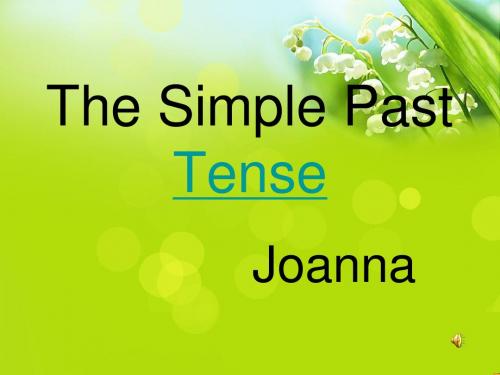
按要求变换句型。 1. Frank read an interesting book about history.(一般疑问 句) _______ Frank _______ an interesting book about history? 2. He cleaned his room just now.(划线提问) What________ he _______ just now? 3. Thomas spent RMB 10 on this book. (否定句) Thomas _______ _______ RMB 10 on this book. 4. My family went to the beach last week. (划线提问) ________ ________ ________ family _______ last week?
&
• English has two types of verbs in the past tense: • Regular verbs • Irregular verbs • Look at the following list of past tense verbs….. • Which verbs are regular,and which are irregular?
5. The shoes are in fashion now. 一般过去时:____________________________________ last year. 否定形式:______________________________________________ 一般疑问句:____________________________________________ 6. Lucy wants to see the dentist at 10 o’clock. 一般过去时:_____________________________________ yeaterday. 否定形式:______________________________________________ 一般疑问句:____________________________________________ 特殊疑问句:When_________________________________________ 7. I meet her in the street. 一般过去时:_____________________________ yesterday afternoon. 否定形式:______________________________________________ 一般疑问句:____________________________________________ 特殊疑问句:Where_________________________________________
the simple past
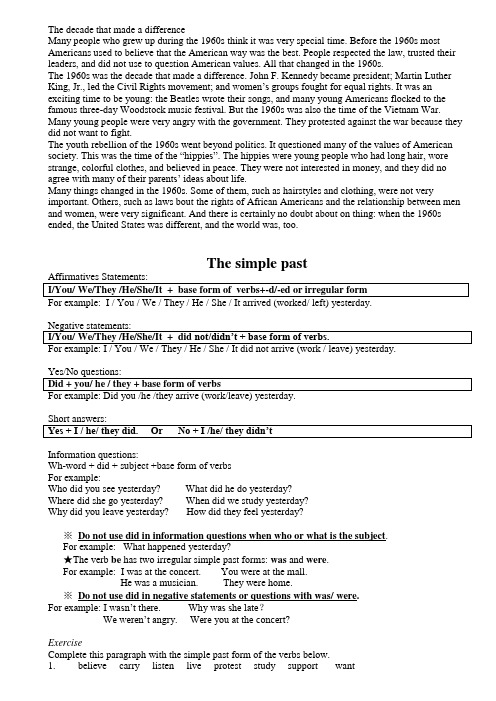
The decade that made a differenceMany people who grew up during the 1960s think it was very special time. Before the 1960s most Americans used to believe that the American way was the best. People respected the law, trusted their leaders, and did not use to question American values. All that changed in the 1960s.The 1960s was the decade that made a difference. John F. Kennedy became president; Martin Luther King, Jr., led the Civil Rights movement; and women’s groups fought for equal rights. It was an exciting time to be young: the Beatles wrote their songs, and many young Americans flocked to the famous three-day Woodstock music festival. But the 1960s was also the time of the Vietnam War. Many young people were very angry with the government. They protested against the war because they did not want to fight.The youth rebellion of the 1960s went beyond politics. It questioned many of the values of American society. This was the time of the “hippies”. The hippies were young people who had long hair, wore strange, colorful clothes, and believed in peace. They were not interested in money, and they did no agree with many of their parents’ ideas about life.Many things changed in the 1960s. Some of them, such as hairstyles and clothing, were not very important. Others, such as laws bout the rights of African Americans and the relationship between men and women, were very significant. And there is certainly no doubt about on thing: when the 1960s ended, the United States was different, and the world was, too.The simple pastInformation questions:Wh-word + did + subject +base form of verbsFor example:Who did you see yesterday? What did he do yesterday?Where did she go yesterday? When did we study yesterday?Why did you leave yesterday? How did they feel yesterday?※Do not use did in information questions when who or what is the subject.For example: What happened yesterday?★The verb be has two irregular simple past forms: was and were.For example: I was at the concert. You were at the mall.He was a musician. They were home.※Do not use did in negative statements or questions with was/ were.For example: I wasn’t there. Why was she late?We weren’t angry. Were you at the concert?ExerciseComplete this paragraph with the simple past form of the verbs below.1. believe carry listen live protest study support wantI was a college student in the 1960s. I _______ history at a university in Chicago. I ______ in an apartment near the university with four classmates. Like many other students, I ______ against the war in Vietnam. My friends and I ______signs that said “peace”. We all______ in peace and freedom. We ______to change the world. We also ______the Civil Rights movement and _______to speeches by its leader, MartinLuther King, Jr.2. take lie run rise fly fall make pay give becomeThe first airplane flight _____ place in Kitty Hawk, North Carolina, on December 17, 1903. Orville Wright _____ face down in the middle of the airplane, and his brother, Wilbur Wright, _____ alongside it. Near the end of the runway, the plane _____ smoothly into the air. It _____ for several seconds, but then it _____ to the ground. This 12-second flight _____ history, but no one _____ attention to the Wright brothers at first. However, after they ______ many public demonstrations of their flying machine, the Wright brothers _____ famous.Write three yes/no and three wh- questions about the paragraph in part 2.Yes/No:○1.○2.○3.Who:○1.○2.When:○1.○2.How for/how many:○1.○2.Where:○1.○2.Why○1.○2.○3.3. Build eight logical yes/no questions. Use a word or phrase from each column. Punctuate your sentences correctly.Did / was /were/It / the party/ the test/ Maria/ you/ the children/ they/ your teamRain yesterday / first/ nervous/ fun/ win/ leave/ difficult/ start on time○1.___________________________________________________________○2.___________________________________________________________○3.___________________________________________________________○4.___________________________________________________________○5.___________________________________________________________○6.___________________________________________________________○7.___________________________________________________________○8.___________________________________________________________4. Working on Yes/No questions and short answers in the simple past.Complete this conversation with di d, didn’t, was, wasn’t, were, or weren’t.Lynn: _______you go to the basketball game yesterday?Gary: Yes, I ________.Lynn: _______it exciting?Gary: Yes it _______great. Maple Valley ______win until the last minute. What ______you and Bill do last night.Lynn: We _______tired, so we _______go out.Gary: _______ you watch that new television show?Lynn: Yes, we _______ but we _______like it. It _______really boring!※ Use the simple past for actions or states that started and ended in the past. Use time expressions to describe the time period.For example: I lived in Boston in 1999. They played baseball on Saturdays.We went shopping yesterday. The garden was beautiful last year.※The actions or states can happen in the recent past (a short time ago) or the distant past (a long time ago).For example: he called five minutes ago. They got married in 1973.She felt tired yesterday. He was very sick the years ago.※The actions or states can last for a long or short period time.For example: I worked there for many years. It rained hard all afternoon.She was ill for six months. He seemed happy to see me.The actions or states can happen once or repeatedly.For example: I graduated on June 5, 1999. He always studied hard before a test.5.Exercise:You were supposed to meet you friend for lunch yesterday, but you didn't. use these words and phrases to make excuses.1. go/ the wrong restaurant. ____________________________________________________2.forget/ the name of the restaurant. _______________________________________________3. have/ an important meeting at work. _____________________________________________4. my car/ run out of gas. ________________________________________________________5. my watch/ stop. ____________________________________________________________6. have/ a terrible headache. _____________________________________________________Time Expressions with the Simple PastYesterday I saw Silvia yesterday.The day before yesterday We didn’t go to school the day before yesterday.This morning / afternoon This morning she stayed home.Last night /week/month/year Where did they go last night?Recently Did you move recently?A few/ several/ many years ago A few years ago he lost his job.A long time ago/ a while ago Rick graduated a long time ago.6.exercise:Write sentence about yourself in the simple past with these time expressions and the phrases below. You can use a time expression more than once.a while ago recently this last the day before yesterday yesterday1. write a letter.__________________________________________________________________2. wash the dishes ________________________________________________________________3. talk to a friend on the telephone ___________________________________________________4. eat in a restaurant ______________________________________________________________5. speak English outside of class _____________________________________________________6. go to the movie ________________________________________________________________7. receive an e-mail _______________________________________________________________8. take a vacation _________________________________________________________________ 7. complete these sentence with one of the time expressions below. There is more than one correct answer for each sentence.last night now recently these days last week nowadays the day before yesterday this morning1.My parents rarely leave home, but _________ they decided to visit Washington, D.C.2.The movie I saw last week scared me to death. ________________I’m afraid to stay home alone.3.My dog and cat are good friends. _______________ I found them playing together in myapartment.4.My neighbors are very noise. They often keep me up until late at night. _______________ Ifinally called the police.5.I was on my college swim team last year. However, _____________ I don't have time for sports.I have too much homework.6.I celebrated my birthday __________________, and Jim didn’t even send me a card.8.Rewrite these simple past sentences and questions with the correct form of used to.1. They walked to the park every Sunday. _______________________________________________2. Were you in the army? ____________________________________________________________3. I didn’t go to the movies very often. _________________________________________________4. He wasn’t a good student in high school. _____________________________________________5. Did your family rent a beach house every summer? ______________________________________6. We visited our parents on weekends. _________________________________________________ 9. Complete these conversations with the words in parentheses and the correct form of used to.Conversation 1A: Where _______________________ (you/ live)B: In Chicago. ___________________ (we/ have) an apartment on Lake Shore Drive.Conversation 2A: _____________________________(Satomi/date) Hiro?B: No, she didn’t, but __________________________(they/be) good friends.Conversation 3A: _____________________________________ (I /not /like) Kevin.B: Yeah. ________________________________ (he/ not /be) nice to me, but now we are good friends.※Used to suggests that a habit or situation was true in the past, but is not true now. Use used to for repeated (or habitual) actions or states that started and finished in the past. Do not use it foractions or states that happened only once. Adverbs of frequency and other time expressions withused to emphasize the repeated actions or states. For example:We often used to visit my grandparents during summer vacation. We don't more.Did you use to travel a lot for work?She used to be unfriendly. She never smiled.This city didn’t use to have subway system in the old days.※You can use the simple present with time expressions to say how a present situation is different from the past. For example:I often used to watch TV after school. Now I don’t have time to do that.In the 1930s people used to get their news from newspapers or the radio. These days mostpeople get their news from TV or the internet.Exercise10. Look at these facts about the past. How is the present different? Write two sentences for each fact, inthe first, rewrite the fact using the correct form of used to. In the second, use the simple present with atime expression and the word or phrase in parentheses.1. Few people had cars. (many)______________________________________________________________________________2. Women didn’t work outside the home. (have jobs)______________________________________________________________________________3. Most people didn’t go to college. (many)______________________________________________________________________________4. Su permarkets didn’t stay open late. (24 hours)______________________________________________________________________________5. People didn’t move away from their families. (live far away)______________________________________________________________________________6. Most people got married very young. (many / in their thirties)______________________________________________________________________________11. Choose the best answer to complete each conversation. Then discuss your answers in small groups.1. A: Did you go to school yesterday? B: __________________a. Yes, I go today.b. No, I was sick.2. I went to the soccer game last night. B:_________________a. who won?b. Is it fun?3. A: When I was young, I used to climb trees. B: ________________a. Did you climb trees?b. Did you ever fall out of one?4. A: Julie finished law school last year. B: _________________a. Is she still in school?b. Did she enjoy it?5. A: It rained here last night. B: _________________a. It didn’t rain here.b. It isn’t raining here.6.A: She didn’t use to live alone. B: _________________a. Did she like living with other people?b. Did she like living alone?12. Some of these sentences have errors. Find the errors and correct them.1. I used to graduate from high school in 1997. 5. He failed his driving test three times!2. We didn’t needed any help. 6. Who give you a present?3. Ana taked the cake to Miguel. 7. When left he?4. Where did they went? 8. You didn’t answer my question.9. The test were on Saturday. 10. What did happened here?。
美英国小学教材资料 simple-past-vs-present
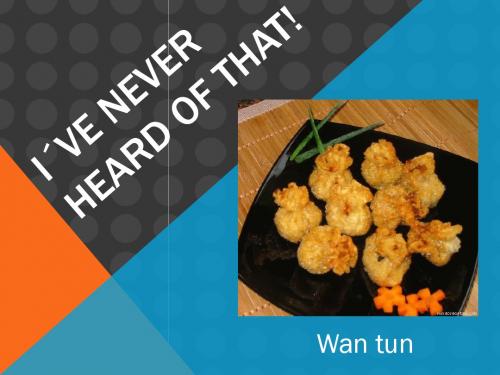
COMPLETE THESE CONVERSATION.
1. A: Have you ever_____________(be) to a picnic at the beach? B: Yes, I_______________. We________________(cook) hamburgers. 2. A: Have you___________________(try) sushi? B: No, I_______________, but I´ d like to.
Steve: Hey, this sounds strange – snails with garlic. Have you ever eaten snails?
Kathy: Yes, I have. I had them here just last week. Steve: Did you like them? Kathy: Yes, I did. They were delicious! Why don´ t you try some? Steve: No, I don´ t think so. Waiter: Have you decided on an appetizer yet? Kathy: Yes. I´ ll have a small order of snails, please. Waiter: And you, sir? Steve: I think i´ ll have the fried brains. Kathy: Fried brains? I´ ve never heard of that? It sounds scary.
HAVE YOU EVER…..?
Have you ever been on diet? Have you ever danced bachata? Have you ever visited Antigua? Have you ever eaten a vegetarian dish? Have you ever danced with someone you don´ t like? Have you ever eaten something uncooked? Have you ever burned food? Have you ever eaten something you didn´ t like? Have you ever lost money? Have you ever told lies? Have you ever baked a cake? Have you ever sung Karaoke?
美英国小学教材资料 past-simple-or-past-continuous
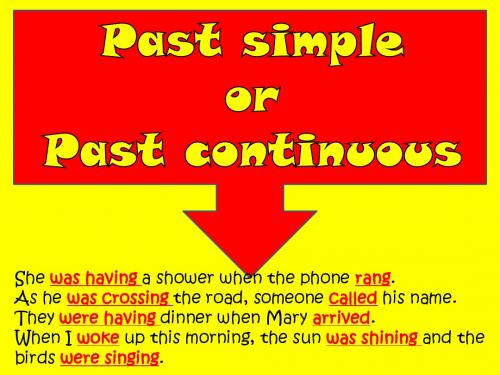
bread.
slipped He ______________ (slip) and fell while were walking (walk) home. they __________________
I ___________________ (not/want) to didn’t want was reading bother her because she _________________
______________ (come) in the room. came
were playing (play) chess when They _________________ came the children _____________ (come) home.
was talking (talk) on the phone He _______________ arrived when the boss _____________ (arrive).
was doing She __________________ (do) some felt (feel) exercises when she ______________ a pain in her chest.
was walking (walk) the dog He _________________ heard when he _______________ (hear) the shot.
was mending (mend) some Daniel ________________ came shoes when the customer ____________ (come) into the shop.
美英国小学教材资料 present-simple-vs-present-continuous-worksheet
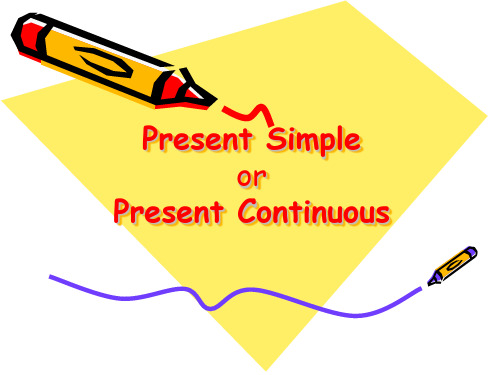
How do we form PRESENT CONTINUOUS?
Negative forms and questions
• Are you eating? I am not eating. • Is she singing? She is not singing. • Are they reading? They are not reading.
2. For situations that are (more or less) permanent.
I live in New York. John works in a bank. Lisa studies architecture.
We use PRESENT SIMPLE…
3. For things we do regularly: hobbies, habits and routines. Every day I get up at 7:30. I have a shower and eat breakfast. Then I take the train to work. Every Thursday I play basketball.
We use PRESENT SIMPLE…
1. For facts or things that are always or generally true. Water boils at 100 C. It rains a lot in Lithuania. The sky is blue.
We use PRESENT SIMPLE…
How do we form PRESENT SIMPLE?
I YOU WE THEY
live
but
美英国小学教材资料 past-perfect-grammar-drills
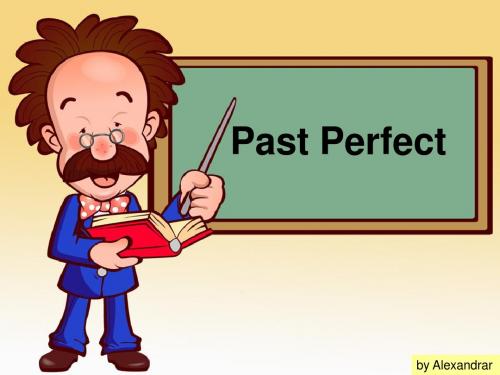
Strange Days in a strange country.
•Anna was crying and her mum looked angry. What had happened?
Strange Days in a strange country.
Masha was running down Sumskoy pr. at midnight. What had happened?
ቤተ መጻሕፍቲ ባይዱ
II. Look at the sentences and decide which happened first
6. Before my parents visited London, they had visited Paris. •My parents visited London. •My parents visited Paris.
had reached
II. Look at the sentences and decide which happened first
1. By the time Charles arrived at the office, the boss had already left for the meeting. •Charles arrived at the office.
Past Perfect
by Alexandrar
I. Fill in the gaps with the Past Perfect of the verbs given
1. When I got to the station, the train ……………….. [already / leave].
II. Look at the sentences and decide which happened first
美英国小学教材资料 past-simple-22
YOUR TURN NEXT 5
Fill in the blanks with a suitable verb in the past simple: 1. Mum …………… her car to the office. 2. Carol …………… an e-mail to Mary. 3. I ………… to school; I……… (not) the school bus. 4. Pam ……………… her teeth three times. 5. ……… Jim ……… the homework? Yes, he ……… 6. I …………… the maths exam! I’m disappointed. 7. Tom ……… a letter to Sandy and then ……… it. 8. Sally ………………… her dictionary, so Mrs Jones …………… angry.
YOUR TURN NEXT 3
• Answer the questions. • Give complete answers. • If the answer is negative, write the correct answer.
What did he cook?
He cooked two lobsters
Did they teach maths?
No, they didn’t. They taught geography
How did they travel?
They travelled by bus
Did he live in Finland?
No, he didn’t. He lived in France
英美小学教育课件 past-simple-or-past
(read) the newspaper.
was boarding (board) the While he ________________ dropped plane, he accidentally _____________
(drop) his case.
He _____________________ (cycle) downhill was cycling failed when the brakes ______________ (fail).
was having (have) While he ______________ knocked breakfast, the postman _____________
(knock) on the door.
When we _____________ (get) home from got was making (make) school, mum _________________
was carrying (carry) the box He _________________ tripped when he _______________ (trip) and fell.
was having (have) a swing She ________________ broke when the branch ______________ (break)
She was having a shower when the phone rang. As he was crossing the road, someone called his name. They were having dinner when Mary arrived. When I woke up this morning, the sun was shining and the birds were singing.
美英国小学教材资料 the-simple-present
• Our plane leaves at eight o'clock tomorrow night.
4. In addition, the Simple Present is used when referring to printed material, and when describing events portrayed in a book, film, or other work of art.
When a verb ends in SS, SH, CH, X, Z and O just add ES. (go – teach – wash – watch – fix – buzz)
The auxiliaries DO and DOES
The auxiliaries DO and Does are used to make the Interrogative and Negative forms.
THE SIMPLE PRESENT
Colégio Vértice Profa. Rita Moretti
Uses of The Simple Present
1. The Simple Present can be used to refer to actions which occur at regular intervals.
Birds fly.
Water freezes at 32 degrees.
32º
Triangles have three sides.
3. Occasionally, the Simple Present is used to express actions occurring in the future.
美英儿童教育资料 past-simple-to-be-1-flashcards
Make negative sentences 1: they/ sad
They weren’t sad
Make negative sentences 2: she/home
She wasn’t at home
Make negative sentences 3: He/supermarket
He wasn’t at the supermarket
PAST SIMPLE: TO BE 1
THE PAST OF TO BE: AFFIRMATIVE
This is the past simple of the verb TO BE: I was We were You were You were He was They were She was It was Look at the impersonal forms: There was There were
Your turn now 1
1. Make affirmative sentences.
2. Use the keywords. 3. Write complete sentences with… was/were there was, there were
Make affirmative sentences 1: John/ doctor’s
There were not (weren’t)
Your Turn now 2
1. Make negative sentences. 2. Use the keywords. 3. Write complete sentences with… was not (wasn’t) /were not (weren’t) there was not (wasn’t) there were not (weren’t)
